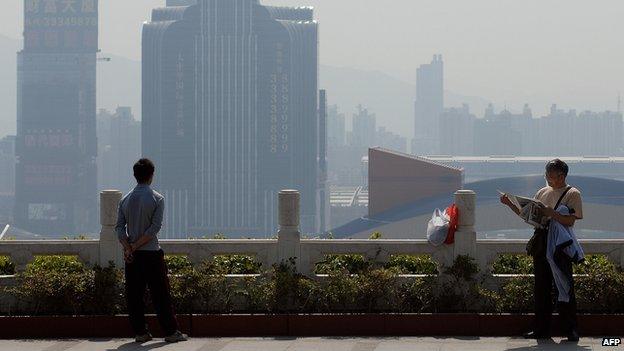China property developer Kaisa defaults on overseas debt
- Published

Shenzhen is one of China's largest cities and is home to many industrial estates and companies
Kaisa Group has become the first Chinese property developer to default on its overseas debt, which is estimated to be about $2.5bn (£1.7bn).
The Shenzhen-based company said it missed two interest payments, raising concerns that more of its creditors could demand their money back.
Kaisa has borrowed billions in order to pay for large land purchases in China.
But the firm ran into trouble after the government froze some of its projects as part of a local corruption probe.
Chinese President Xi Jinping has spearheaded one of the country's most severe crackdowns on corruption, resulting in many companies and top public officials coming under scrutiny.
Investors have been closely watching Kaisa's troubles after its assets were frozen and senior management stepped down last year, raising concerns the company was going to collapse.
Its founder and chairman Kwok Ying Shing unexpectedly resigned on 31 December because of health reasons, but he returned to the company this month and has been reinstated.
The firm's Hong Kong-listed shares were also suspended in December after losing about half of their market value and ratings agencies downgraded the firm's credit outlook.
However, Kaisa recently regained permission to restart the projects that had been frozen.
Bond markets
Kaisa's troubles have unnerved the local stock and bond markets, particularly for investors who have bought into other Chinese real estate developers.
Any trouble in China's property market is closely-watched because the sector accounts for about a third of the country's gross domestic product.
The price of Kaisa's US dollar bonds fell on Tuesday after the default was officially announced on concerns the developer may not be able to fulfil its financial obligations.
However, the developer has been in talks with creditors over a restructuring that will allow them to have extended repayment deadlines and lower interest rates.
Rival developer Sunac is also bidding for a controlling 49.3% stake in the company.
- Published2 September 2014
- Published29 July 2019